We asked a few female leaders across Metro Vancouver about their definition of feminism, what women inspire them and the most surprising comments they’ve received in the top job. Their answers will inspire, delight and maybe even shock you.
Kathleen Bartels
Director, Vancouver Art Gallery
What does feminism mean to you? • It means equal rights, equal pay and equal opportunities for all, irrespective of gender, class and ethnicity. I believe that we are now creating our own version of feminism, one that is more inclusive and intersectional. We still have much work to do to create opportunities and raise the profile of women leaders.
Who are your female mentors? • In the arts community and professionally, internationally renowned artist Cindy Sherman has had a great influence on me. She has produced many important works on women’s identity and aging. She was able to break the glass ceiling by challenging the status quo and establish herself as one of the great artists of our time. Another mentor, someone I knew personally, was the late Zaha Hadid. She was the first woman and the first Muslim architect to receive the Pritzker Architecture Prize and the Stirling Prize. I have always admired her tenaciousness and her groundbreaking ideas. On a personal level, my two sisters – one is an artist and the other a cultural anthropologist – have played and continue to play an influential role in my life, and I often go to them for advice.
What’s the best part about being a leader? • The best part about being a leader is being able to envision the possibilities, to define the best path toward reaching goals, to possess the tenacity and courage to pursue their fulfilment and to have the passion necessary to inspire and lead others. My team is really important to me as I enjoy collaborating with people and empowering others. I do believe that female leaders are more collaborative, sensitive and focused around shaping genuine partnerships.
What is the most surprising thing someone has said to you as a female leader? How did you respond? • I’m always surprised when I’m confronted by gender role stereotypes, but I’ve certainly been exposed to more biases recently as we work towards our vision for a new purpose-built art gallery. These gender biases often come from outside the art world and from both men and women. The most important thing for me in these situations is to stay confident, determined and resilient, and to continue to stay focused on my work and achieve the best results for the Vancouver Art Gallery.
What advice would you give young women entering the workforce today? • The best advice I could give is to be patient, because not everything comes quickly. Be persistent and confident, and persevere. Seize every opportunity that comes your way. Also, be supportive of other women and empower other women. Seek out organizations with women in strong leadership roles. Be the change you want to see!
Karina Briño
President and CEO, Mining Association of BC
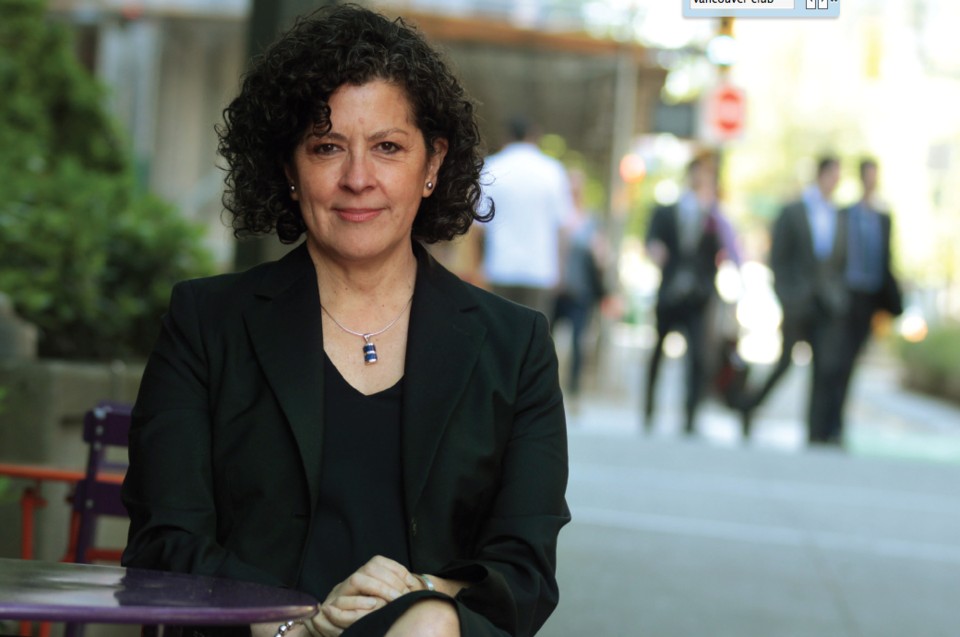
Photo: Rob Kruyt
What does feminism mean to you? • For me, it’s about sharing a common goal of equal opportunities for women. We need to create these opportunities not just in business, but also in academia, sciences and across all sectors. To me, this is society’s responsibility. This isn’t a women’s problem.
Who are your female mentors? • There are definitely public figures that have influenced me in one way or another throughout my career. That said, my most influential mentors have been my mother and grandmothers. I grew up in Chile, in a family where women went to school, worked, voted and contributed to society. They inspired me to do whatever I wanted in life – to be the best I can be.
What’s the best part about being a leader? • The most rewarding experience is seeing people grow, both men and women. To me, leadership isn’t about being popular. It’s about providing support and empowering others to strive to be the best they can be and providing them with the tools to thrive, to be engaged and encouraged.
What is the most surprising thing someone has said to you as a female leader? How did you respond? • I was working in a senior policy role in government and attended my first industry meeting at a mining conference. When I arrived, I was asked to sit at the back of the room. They thought I was an assistant. I wasn’t personally offended, but it was an incredibly important eye-opener. The best part was the reaction from my boss – a man. He said, “She’s at the table, I’m at the back.” I don’t think I could’ve asked for a better outcome.
What advice would you give young women entering the workforce today? • Sometimes being a woman in a leadership role is associated with competitiveness. I think it’s completely the opposite. As women we need to support each other; together, we can strive to be better. We need to work together to get through the issues we’re constantly facing.
Amiee Chan
President and CEO, Norsat International Inc.
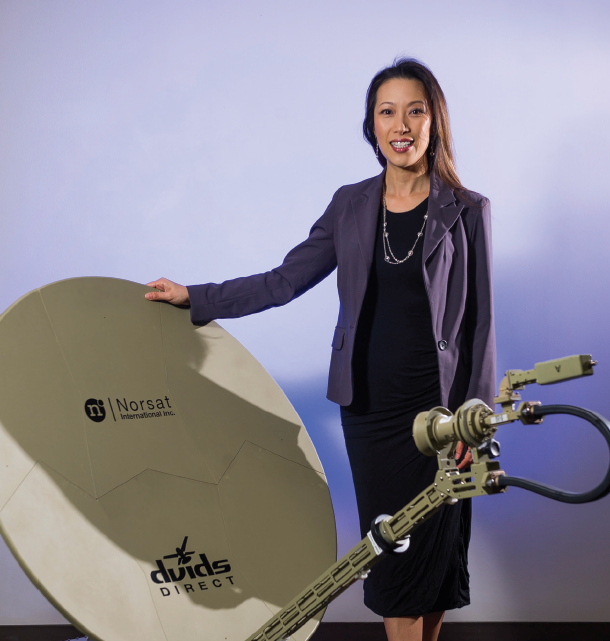
Photo: Richard Lam
What does feminism mean to you? • It’s about fighting for women’s rights, whether they’re political, economic or social. It’s something I believe strongly in, whether it’s in education, the workforce or anywhere women pursue their careers.
Who is your female mentor? • My mother. She’s the person I look up to. She’s always instilled in me a sense of responsibility and given me the confidence to know that I can do whatever I set my mind to.
What’s the best part about being a leader? • For me, it’s about venturing into the unknown and taking our team to places where maybe we haven’t been before. It’s about trail-blazing. When I first started in my role, the company was in financial dire straits because the previous strategy was focused on large military orders, which weren’t realized. We had to find alternative sources of revenue. Today, I’m happy to say, we’re doing quite well.
What is the most surprising thing someone has said to you as a female leader? How did you respond? • Someone did ask me once if my father owned the company. They couldn’t figure out how a young female ended up in the position I’m in today. I think they were just trying to make conversation. I explained to him that Norsat is a public company and that I worked my way up to the top. I started as a co-op student.
What advice would you give young women entering the workforce today? • Don’t shy away from being different. Follow your heart. Follow your passion. It sounds cliché but it’s true. Also, when it comes to work-life balance, draw a line between your personal life and your career. You may have to cross that line from time to time, and don’t beat yourself up when you do. Try your best.
Brenda Ireland
Principal, First Light Initiatives
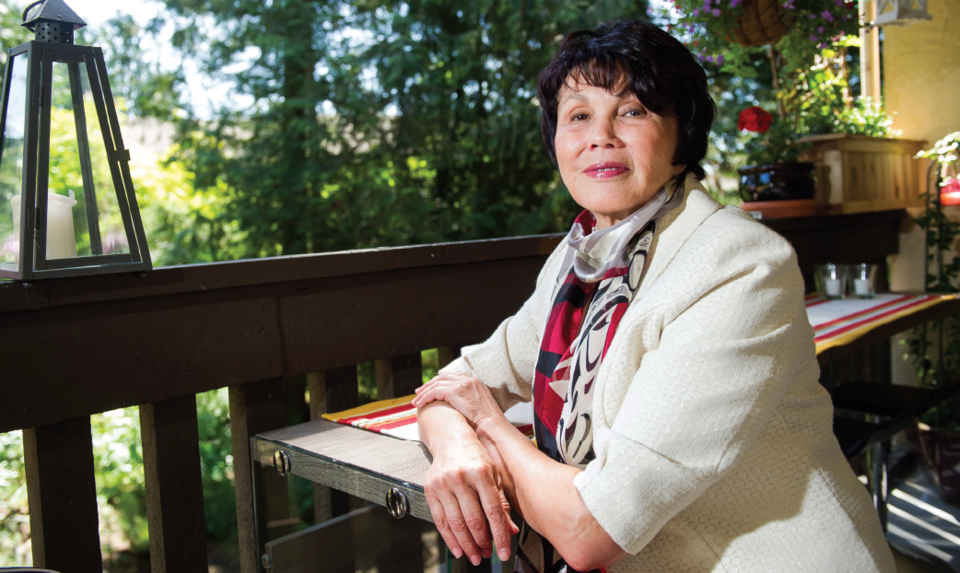
Photo: Richard Lam
What does feminism mean to you? • Equality in the social, economic, political and legal spheres so women can claim their power – their rightful place – in realizing the gifts the Creator has given them.
Who are your female mentors? • Minquon Minquon (Shirley Bear) from Nequotkuk (Tobique), New Brunswick, an artist, poet, feminist and activist, who took a fledgling human being and helped me find my way to my identity as an indigenous woman. Also my mother, the late Phyllis Ireland, who, with quiet grace and dignity, taught that even in difficult circumstances one can find a way to express one’s right to be who one is.
What’s the best part about being a leader? • One of my philosophies for leadership is an anonymous quote: “I must catch up with the others for I am their leader.” It captures my approach, which is to be a catalyst that brings people together, establishes a team that creates a vision, goals and strategies and then guides/mentors, believing that the team has the imagination, skills and fortitude to accomplish exciting and incredible things. I am amazed by how having the courage to believe in people can inspire others to achieve and effect change.
What is the most surprising thing someone has said to you as a female leader? How did you respond? • I was asked by a dean of a post-secondary institute about what was different for me that led to my graduating with a master’s degree, when my siblings had not graduated high school. I couldn’t answer the question then and am not sure I can today. Perhaps it has to do with being the eldest, with knowing my father had incredibly high aspirations for me. Perhaps it was because I heard “dirty squaw and half-breed will never amount to anything” just one too many times growing up and I wanted to prove them wrong.
What advice would you give young women entering the workforce today? • Look for opportunities to step outside your comfort zone – if necessary, fake it ‘til you make it. Act like you know what you’re doing even though you may be finding your way as you go along. Setting the bar high expands your skills, pushes you to be creative and asks you to be courageous. There are times when I question my ability, my place in the world. Harsh words and lessons of racism and the legacy of a challenging childhood are sometimes not far from the surface. That’s when I draw on my experience, strengths, self-confidence, dignity and assertiveness, remembering the gifts of faith and encouragement I’ve received from many friends – men and women, youth and elder.
Lisa Niemetscheck
General manager, Forum for Women Entrepreneurs (FWE)
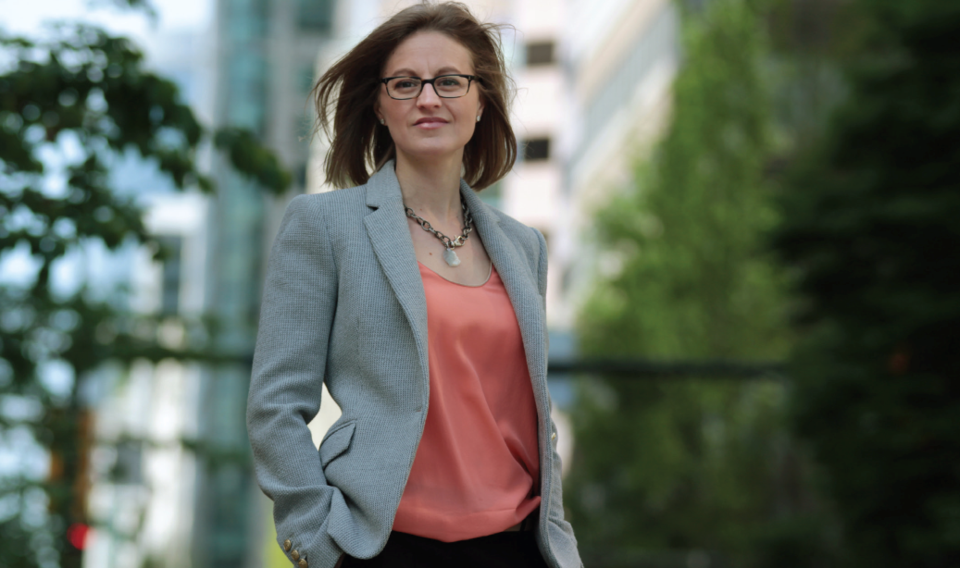
Photo: Rob Kruyt
What does feminism mean to you? • For me, it means ensuring that opportunities are available to all women to shape their future, personally and professionally, and that we as a society embrace this.
Who are your female mentors? • My female mentors are Judy Brooks (an FWE board member) and Christina Anthony (FWE’s founder and chair). When I’m meeting others and providing feedback and advice on their business situations, I hear myself telling the big learning stories and recalling the lessons that I have learned from them. They have taught me so much about leadership, service, professional relationships, strategy and so much more. Because of their perspectives, the lens that I use to look at challenges and opportunities has been a game-changer and has shaped who I am today.
What’s the best part about being a leader? • Having an impact – whether it’s in women’s businesses and careers, at the table or on the future of FWE. None of us operates alone, so through my work at FWE and now as an incoming co-chair of the WEB Alliance, I am fortunate to work with an incredible board, mentors and other business and community leaders to turn the dial ahead for women in B.C. and across the country.
What is the most surprising thing someone has said to you as a female leader? How did you respond? • I’m lucky to be part of a business community that embraces diversity and champions women in business. I experienced nothing but respect and support. That’s my story, though, and others aren’t so lucky. When I was just starting out my career, almost every conversation with one particular colleague involved a lewd comment followed by laughter (his, not mine). There’s still a lot of work to do to change attitudes towards women in trades, female students, interns and leaders.
What advice would you give young women entering the workforce today? • Reach out to one or two senior-level leaders – women or men – who might mentor you. Many larger workplaces already have peer mentorship programs, and where a workplace does not, it means you need to take the future in your own hands and be proactive. Reach out and have conversations. Being able to talk about career goals and skills development can provide encouragement and open the doors that are needed to move ahead. Business leaders want to see the next generation succeed and are so often happy to give back with their time, experience and feedback.
Ratana Stephens
Co-CEO and co-founder, Nature’s Path Foods
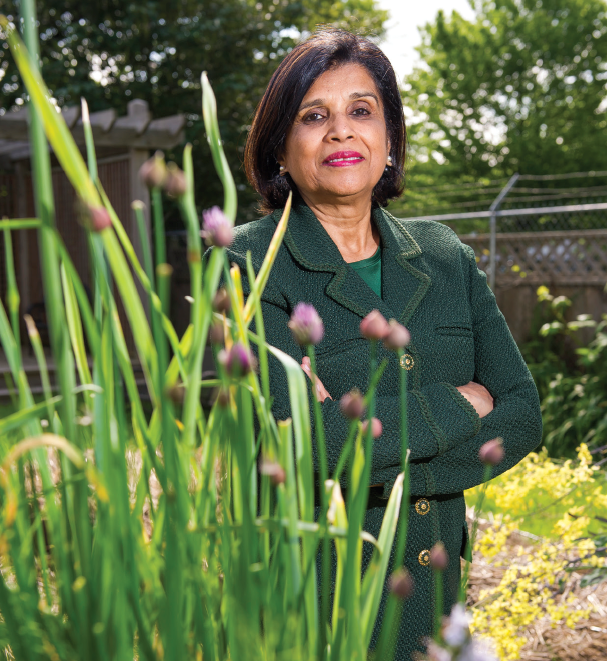
Photo: Richard Lam
What does feminism mean to you? • Feminism does not mean superior to or better than men. It means equality. It means freedom to choose whatever a woman wants, whether profession, education, religion or tradition. It’s the freedom to contribute to society singly or with an understanding spouse or partner.
Who are your female mentors? • My grandmother was my first real mentor. She was a widow at age 17 and brought up her three sons single-handedly in rural India. She was brave, strong-willed, loving and wise. She encouraged me to get a top education and stand on my own two feet. Another great mentor for me was the late prime minister of India, Indira Gandhi. Although a controversial leader, she was a dutiful daughter, who, I feel, put the interests of the country first. There are also so many others, like Golda Meir, Amelia Earhart, Eleanor Roosevelt and Rachel Carson, who wrote Silent Spring and is the mother of the environmental movement. She has been and still is an inspiration. We stand on the shoulders of these and many other great women.
What’s the best part about being a leader? • Having the freedom to serve, motivate and help shape the future.
What is the most surprising thing someone has said to you as a female leader? How did you respond? •
One day about 22 years ago, after our company started to stabilize, I was grocery shopping in Vancouver, picking up food for my family, when a woman I didn’t know tapped on my shoulder and said she was very impressed by my business leadership. I was taken aback. Me, a leader? Impressed with me? I was just this humble woman from partition-era India creating a livelihood for my young family, hanging on by the skin of my teeth. I had no MBA, no background in business or manufacturing, no training in finances or human resources. I didn’t feel like a leader at all. But then the scenario repeated itself. I responded by upgrading my education – taking courses and reading about marketing, manufacturing, finance and leadership – to propel myself into the leader I was meant to be.
What advice would you give young women entering the workforce today? • Choose a goal, a path, and charge ahead with single-minded focus. Seek the best advice of others, and then decide for yourself the best path. Don’t let your fear hold you back. You will encounter successes and failures, ups and downs. These are all part of the journey. A success is a failure that never gave up.




